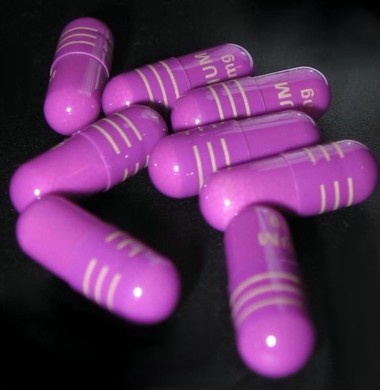The Purple Pill Called Nexium: you can’t escape its ubiquitous commercials. The highly touted antidote to heartburn is one of the most widely used medicines in America; in 2012 it brought its maker, Astra Zeneca, nearly $6 billion.
That’s because acid reflux and heartburn are so common among us, with 60 million Americans enduring at least one bout of heartburn each month. According to some studies, 15 million fight it it every day.
But Nexium and its ilk don’t really heal the digestive system, say many nutritionists, including Craig Fear of Pioneer Valley Nutritional Therapy, author of a newly released e-book, The 30-Day Heartburn Solution (http://the30dayheartburnsolution.com).
Just lowering the acidity of your stomach, Fear explains, may not cure your digestive problems, and may even make them worse, since compromised acidity can cause problems in the stomach and “south” of it, in the gastrointestinal tract.
Without enough acid, he points out, the stomach can’t digest food properly, and poorly digested food sets the stage for intestinal leakage, irritable bowel syndrome and “all those conditions that end in -itis.”
Furthermore, lowering stomach acidity may reduce the body’s ability to absorb important minerals such as iron, calcium and magnesium; even Nexium’s own commercials warn that osteoporosis and bone fractures may result from its use as a result of lowered magnesium levels in the body.
In order to do more than relieve heartburn and other symptoms of gastroesophageal reflux disease, says Fear, you need to treat the whole digestive tract—not with drugs but with food that nurtures the digestive organs and the microorganisms that promote digestion.
Fear’s advice is not just negative. He has plenty to say about getting sweeteners, chemicals and bad fats out of our diets, but he wants us to get the right foods into them—and they’re not low-fat or “lite” foods, products he finds nearly worthless.
Rather, he recommends affordable foods that are alive with natural processes, natural substances and natural organisms: raw milk, fermented foods like pickles, sauerkraut and kimchi, and that favorite of our great-grandmothers, bone broth.
Raw milk, Fear says, should be taken when symptoms of heartburn or acid reflux come on, as if it were an antacid. Many of his clients experience it as soothing, he says, and it provides calcium and other minerals, vitamins, and—vital resources in Fear’s pharmacopoeia—enzymes and benign bacteria. On the other hand, since some people benefit by eliminating dairy from their diets temporarily, Fear recommends laying off raw milk if it doesn’t produce the desired effect.
Fermented vegetables and other fermented foods may be a little too pungent for many Americans, and many of us are afraid of skidding over the line between fermentation and toxic spoilage. Still, fermenting has become somewhat trendy over the last few years, and its biota-rich products are on the side of the angels, Fear says, when it comes to promoting a healthy digestive system. Not everyone will likely find beet kvass as appetizing as he does, but you don’t have to go that far.
Pickles and sauerkraut that are properly fermented, not just made with vinegar and preservatives; cultured yogurt that isn’t drowning in sweeteners; whole milk cheeses; and more exotic fermented foods, such as miso and kimchi, can be added to their diets by people who aren’t super-confident about fermenting their own foods. As Fear told the Advocate, there are many ethnic fermented foods; not mentioned in the book, but familiar to many in the Valley, are giardiniera (when the vegetables are fermented, not just pickled) and Polish zurek, a soup with a fermented rye base.
And Fear extols the merits of bone broth, which is easy to make and virtually free for those who eat meat—you just save leftover bones and boil them. Not only does it offer easily digestible protein, he points out, but it’s loaded with calcium and other minerals, and it contains collagen, which is good for the digestive system and (arthritis sufferers, take note) the joints.
Finally, there is no real substitute for foods that soothe and nourish the digestion, according to Fear, who warns against using supplements as the “quick fix.”
Fear notes that “not all supplements are created equal. … For example, most supplements sold in pharmacies and big-box grocery stores are very poorly made. That is why they are usually cheaper in those places. Most of those supplements contain synthetic minerals and vitamins, which are made in a laboratory, from non-food ingredients such as petroleum. Others extract isolates of vitamins, which are not whole vitamins. For example, you’ll frequently see vitamin C labeled ‘Vitamin C (as ascorbic acid).’ Ascorbic acid is a component of vitamin C but not true vitamin C. Our body does not use isolates the same way it uses whole foods. Some suggest they can even be toxic.”
Refreshingly, Fear is not a nutrition Nazi. If you get so far into his plan that you try making bone broth (easy) or fermenting foods (not so easy), “You will make things that will WOW you,” he predicts. “And you will make things that will make you pick up the phone and order out.”
Mindful of the difficulty the American marketplace poses for those trying to stick to the kinds of foods that nourish the digestion, he urges, “Don’t stress it when you find yourself in situations where there is nothing you can do—airports, sporting arenas or perhaps a holiday trip to a relative. There is something to be said for the 80-20 rule, that is, if you can eat real food 80 percent of the time, you can probably get away with eating not-so-real food 20 percent of the time.”•



